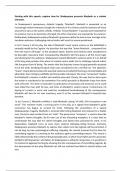Exam (elaborations)
Grade 9 AQA GCSE Literature exemplar essay 'Starting with this speech, explore how far Shakespeare presents Macbeth as a violent character'
This is a grade 9 essay that can be used as an example to revise violence in Macbeth for AQA GCSE English literature.
[Show more]



